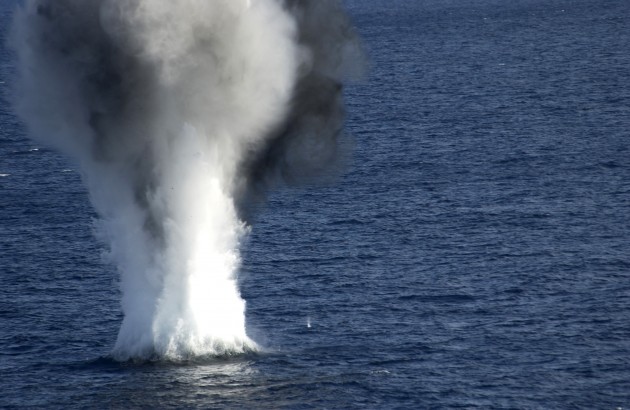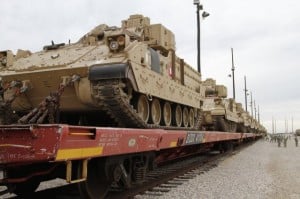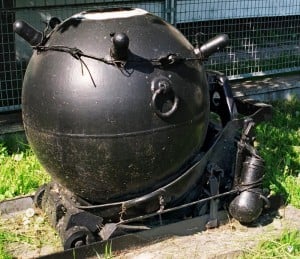Smart Mines, A Smaller Army, & The Trump Buildup That Won’t Happen: Winnefeld
Posted on

SAN DIEGO: Trump’s promised defense budget boost probably won’t materialize, the former Vice-Chairman of the Joint Chiefs said today, so we can’t afford to grow a larger military. Instead of more ships and troops, retired Adm. James Winnefeld said in a rare public appearance, the military should prioritize investment in new ideas. His own service, for example, should overcome its post-1945 reluctance to lay mines off enemy shores and deploy networks of smart mines. The Army should cut soldiers to buy more modern equipment and stockpile a lot of it in Europe.

Retired Admiral James Sandy Winnefeld
The defense world is suffering from “irrational exuberance,” Winnefeld warned the AFCEA-USNI West 2017 conference here this morning. It’s like Charlie Brown thinking Lucy is really going to let him kick the football this time, he said: There’s a “yawning gap between the expectations that are being raised regarding increases to our defense budget and the likely real outcomes.”
“All the talk about a major plus-up has got a lot of people in the services and in industry pretty excited about what we might do with all of this manna from heaven,” Winnefeld said, “(but) does anybody here believe our Congress will really deliver on this?” Trump’s deficit-busting agenda — a stronger defense, a border wall, new infrastructure, tax cuts, and by the way no reductions in entitlements — is too much for a legislature that can’t even pass routine annual spending bills on time, the admiral argued.
Compounding the problem, Winnefeld continues, is the military’s institutional preference for spending on force structure — Navy ships, Army brigades, Marine battalions, Air Force squadrons — rather than on modernization to keep those forces cutting-edge or readiness to keep them operational. In lean times, he lamented, we cut force structure last; in good times, we buy it back first. Fortunately, he said, both Defense Secretary James Mattis and Navy leadership have put readiness funding first — but they’ll be under heavy pressure from Congress, the media, and the think-tanks to grow the force.

Bradley armored vehicles from the 1st Cavalry Division shipping out for a deployment to Eastern Europe.
“We definitely need more ships,” Winnefeld said, “but we really need ready and modern ships that support a modern warfighting concept…. Yes, quantity has a quality all its own but not if it’s in the wrong place, not if it’s not ready, not if it’s not modern.”
In land warfare, likewise, the Russians are a major threat to Europe, and we need heavy Army forces to deter them, Winnefeld said, but “buying a lot more troops to handle that that are garrisoned in United States congressional districts is not the answer.” (Former European Command chief Philip Breedlove has even suggested the Russian fleet could block reinforcements moving across the Atlantic). Rather than ship units across the sea, Winnefeld said, the Army needs a large stockpile of advanced equipment ready to go in Europe.
“That is going to require a smaller Army because we’ve got to pay for it,” Winnefeld said. “I wouldn’t take a dime away from the Army, but I would change their operational concept for winning in Europe.” Unfortunately, he said, both the Army and its supporters in Congress have a deep emotional commitment to keeping the largest possible force.
Instead of trying to grow larger, Winnefeld argued, the military would do better to try to grow more innovative. “We need to allow a little more chaos into our thinking,” he said. “From what I heard from Harry Harris yesterday, I think he would agree.” (Adm. Harris, who leads US Pacific Command, had made his own call for innovation at the conference earlier).

A version of the classic M-08 mine, now over a century old.
Smart Mines
What’s a good example of a radical idea? Consider “offensive mine warfare,” Winnefeld said. The US Navy has focused on rebuilding its own long-neglected minesweeping capabilities, and its own ability to lay mines in the path of enemy shipping is poor.
“But imagine what could be done with the state of the art of the technology we have today,” Winnefeld said. A networked flotilla of smart mines could communicate with each other and their distant human masters, then adjust their operations accordingly, rather than float dumbly waiting for something to hit them. They could use advanced sensors to target specific types of vessels precisely, rather than all shipping indiscriminately. They could launch guided torpedoes and other weapons to strike distant targets, rather than wait for an enemy ship to sail right overhead. (While Winnefeld didn’t use the term, a fairly sophisticated artificial intelligence would be required: The systems he’s describing are less like traditional mines and more like robotic weapons pods).
“We’re not doing this. Why?” Winnefeld said. At least three reasons: “(1) There really is no sponsor who believes in it and will take money from something else. (2) Maybe it seems like something only a small weak navy would do. (3) And some might wonder if we’d ever even be allowed to use it.”
Certainly, unleashing robotic ship-killers in international or foreign waters would raise all sorts of interesting legal issues. But the US Navy has not always been so squeamish. In World War II, naval mines combined with unrestricted submarine attacks to ravage Japanese shipping and starve the island nation of vital supplies. After 1945, however, the US Navy increasingly saw itself as the guardian of global sea lanes and the defender of shipping, not an attacker. With the rise of Chinese and Russian seapower, however, the US Navy once again faces the prospect of fighting to control the seas, which may require denying enemy control of vital areas through minelaying and submarine attack.
“I’m not saying that offensive mines are the answer. What I am saying is offensive mines can be a part of a really different concept (of operations),” Winnefeld told me after his remarks. “It’s a part of that answer.”
Innovative technology isn’t the solution on its own, Winnefeld emphasized: It requires an equally innovative concept for how to use it. “What I’m arguing is for is to have a process where the concept and the technology interact with each other,” he told me. “That’s really what I think we’re a little short on right now; I think it’s what Harry Harris was asking for yesterday. I need the big minds not only building cool widgets but integrating a widget and a concept into something that presents that a new dilemma for the enemy.”
Subscribe to our newsletter
Promotions, new products and sales. Directly to your inbox.
